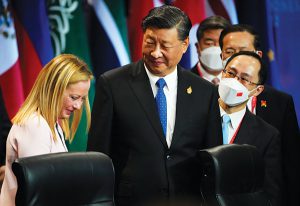Bloomberg
President Xi Jinping started his week overseas mending ties with the US, and ended it with European leaders making the case for resisting the Biden administration’s sweeping chip curbs on China.
The shift in sentiment amounts to a victory for Xi on just his second foray outside of China since the pandemic began —a span that had seen Beijing’s relations with the US and its allies go from bad to worse. In October, President Joe Biden restricted the sale of semiconductors and chipmaking equipment to China in a bid to stem its economic development, and asked key allies to comply — raising fears of a split in the global economy.
French President Emmanuel Macron called for engagement with Beijing and resisting efforts to divide the world into competing blocs. That followed similar appeals from German Chancellor Olaf Scholz, who visited China earlier this month, and efforts by Dutch Prime Minister Mark Rutte to coordinate with other key chipmaking nations in resisting US pressure.
“Now, progressively, a lot of people would like to see that there are two orders in this world,†Macron said in a speech to business executives at the Asia-Pacific Economic Cooperation CEO summit in Bangkok. “This is a huge mistake, even for both the US and China.â€
“We need a single global order,†he added, a line that drew extended applause.
The French leader’s comments in particular show Europe is finding its footing in carving out a middle ground when it comes to China. While calls have grown in some European capitals to get tougher with Beijing on issues related to human rights and democracy, the sweeping US export controls on chips— which may soon be extended to other strategic technologies — have shifted the conversation from fears about China to concern about American overreach.
‘Little Appetite for
Confrontation’
With Germany heading toward recession and Europe facing a harsh winter without cheap Russian oil and gas, “there is little appetite for confrontation with Beijing,†said Noah Barkin, managing editor of the Rhodium Group’s China practice.
“For all the rhetoric about standing up to Xi, forging a common European front and mitigating the risks of economic engagement with China, the actions over the past month have fallen short,†he said. “The risk, if this continues, is more cracks in the transatlantic relationship. We are already seeing some of these cracks in Europe’s reaction to recent US technology controls aimed at China.â€
 The Gulf Time Newspaper One of the finest business newspapers in the UAE brought to you by our professional writers and editors.
The Gulf Time Newspaper One of the finest business newspapers in the UAE brought to you by our professional writers and editors.
